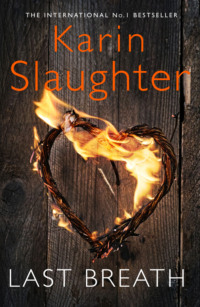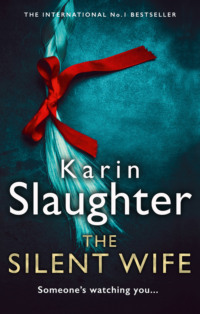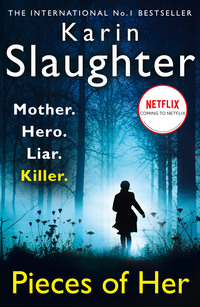
Полная версия
The Good Daughter: The gripping new bestselling thriller from a No. 1 author
Then little Lucy Alexander rounded the corner.
Pop.
Then Mr. Pinkman rushed out of his office.
Pop-pop-pop.
Then the bell had rung and, but for some quick-thinking staff, a sea of fresh victims would have rushed down that same hallway.
Goth. Loner. Held back a grade.
Kelly Wilson was the exact type of girl who got bullied. Alone at the lunch table, last to get picked during gym, attending the school dance with a boy who only wanted one thing.
Why had Kelly picked up a gun when Charlie hadn’t?
Lenore said, “At least drink that Coke in the cooler. It’ll help with the shock.”
“I’m not in shock.”
“I bet you think your nose isn’t broken, either.”
“Actually, I do think it’s broken.” Lenore’s persistent mentions of Charlie’s health finally made Charlie aware that her health wasn’t that great. Her head was in a vise. Her nose had its own heartbeat. Her eyelids felt like they were weighed down with honey. She gave in for a few seconds, letting them close, welcoming the blankness.
Over the hum of the engine, she could hear Lenore’s feet working the pedals as she shifted gears. She always drove barefooted with her high heels on the floor beside her. She tended toward short skirts and colored stockings. The look was too young for a seventy-year-old woman, but considering that Charlie currently had more hair on her legs than Lenore, she couldn’t sit in judgment.
“You need to drink some of that Coke,” Lenore said.
Charlie opened her eyes. The world was still there.
“Now.”
Charlie was too exhausted to argue. She found the cooler wedged against the seat. She took out the Coke but left the sandwich. Instead of opening the bottle, she held it to the back of her neck. “Can I have some aspirin?”
“Nope. Raises the risk of bleeding.”
Charlie would’ve welcomed a coma over the pain. There was something about the bright sun that had turned her head into a giant, ringing bell. “What’s that thing you get in your ears?”
“Tinnitus,” Lenore said. “I’ll stop the car if you don’t start drinking that Coke right now.”
“And let the police get to the Wilson house before we do?”
“They’d have to leave out on this road, for one, and for two, even if they find the location of the house, and even if they have a judge standing by, it’ll take at least half an hour to put the warrant together and three, shut the hell up and do what I tell you before I pop you on the leg.”
Charlie used her T-shirt to twist off the cap. She sipped the Coke and watched downtown slip into the side mirror.
Lenore asked, “Did you throw up?”
“Pass.” Charlie felt her stomach clench again. The world outside was too disorienting. She had to close her eyes to regain her equilibrium.
The slideshow popped into her head again: Lucy Alexander. Mr. Pinkman. Gamma. Sam. Charlie clicked through the images quickly like she was searching for a file on her computer.
What had she said to special agent Delia Wofford that might hurt Kelly Wilson’s defense? Rusty would want to know. He would also want to know about the number and sequence of gunshots, the capacity of the revolver, what Kelly had whispered when Huck was begging her to give him the gun.
That last part would be crucial to Kelly Wilson’s defense. If she had made an admission, if she had offered a glib comment or stated a grim motive for her crimes, then no amount of oratory flourish on Rusty’s part would save her from the needle. Ken Coin would never turn such a high-profile prosecution over to the state. He had argued two capital cases before. No jury in Pikeville would refuse his request for death by lethal injection. Coin spoke with a particular authority. Back when he was a police officer, he’d executed a man with his own hands.
Twenty-eight years ago, Daniel Culpepper, Zachariah Culpepper’s brother, had been sitting in his trailer watching television when Officer Ken Coin had rolled up in his squad car. It was eight thirty in the evening. Gamma’s body had already been found at the farmhouse. Sam was bleeding her life away in the shallow stream that ran under the weather tower. Thirteen-year-old Charlie was sitting in the back of an ambulance begging the paramedics to let her go home. Officer Coin had kicked down the front door to Daniel Culpepper’s trailer. The suspect had grabbed his gun. Coin had shot the nineteen-year-old seven times in the chest.
To this day, the majority of the Culpepper clan insisted on Daniel’s innocence, but the evidence against the kid was incontrovertible. The revolver found in Daniel’s hand was later identified as the same weapon that had been used to shoot Sam in the head. Daniel’s blood-covered jeans and distinctive blue hightops were found smoldering in a burn barrel behind the trailer. Even his own brother said they both went to the HP to kill Rusty. They were worried they would lose their home over some stupid legal bill they assumed would come due after the Quinns lost everything in the fire. Charlie was left to survive the ordeal with the knowledge that her family’s life had been reduced to the price of a used trailer.
Lenore said, “We’re going past the school.”
Charlie opened her eyes. Pikeville Middle School had been Pikeville Junior High when Charlie was a student. The building had sprawled over the years, hastily overbuilt to accommodate the twelve hundred students pulled in from the neighboring communities. The high school beside it was even larger, meant to house almost two thousand kids.
She saw the empty space where her car had been parked. Police tape cordoned off the lot. There were other cars that belonged to teachers scattered among the police cruisers, government sedans, ambulances, fire trucks, crime scene buses, the coroner’s van. A news helicopter was flying low over the gymnasium. The scene felt surreal, like a director would yell “cut” and everyone would take lunch.
Charlie said, “Mrs. Pinkman had to be sedated.”
“She’s a good woman. She doesn’t deserve this. Nobody does.”
Charlie nodded because she couldn’t talk past the glass in her throat. Judith Heller Pinkman had been a weird touchstone to Charlie over the years. They would see each other in the hall when Charlie finally went back to school. Miss Heller always smiled, but she didn’t push Charlie, didn’t force her to talk about the tragedy behind their connection. She kept her distance, which in retrospect, took a kind of discipline that most people didn’t possess.
Lenore asked, “I wonder how long the media attention will last?” She was looking up at the helicopter. “Two victims. That’s quaint compared to most mass shootings.”
“Girls don’t kill. At least, not like this.”
“‘I Don’t Like Mondays.’”
“In general, or do you mean the Boomtown Rats’ song?”
“The song.” Lenore said, “It’s based on a shooting. 1979. A sixteen-year-old girl took a sniper rifle to a playground. I forget how many she killed. When the cops asked her why she did it, she said, ‘I don’t like Mondays.’”
“Jesus,” Charlie whispered, hoping like hell that Kelly Wilson hadn’t been that callous when she had whispered whatever she’d said in the hallway.
And then Charlie wondered why she cared about Kelly Wilson, because the girl was a murderer.
Charlie was jarred by the sudden clarity of thought.
Take away all that had happened this morning—the fear, the deaths, the memories, the heartache—and Charlie was left with one simple truth: Kelly Wilson had murdered two people in cold blood.
Unbidden, Rusty’s voice intruded: So what?
Kelly still had a right to a trial. She still had a right to the best defense she could find. Charlie had said as much to the angry group of cops who had wanted to beat the girl to death, but now, sitting in the car with Lenore, Charlie wondered if she had come to the girl’s defense simply because no one else would.
Another personality flaw that had become a sore point in her marriage.
She reached into the back seat, this time for her court clothes. She found what Ben called her Amish shirt and what Charlie considered one step up from a burka. The Pikeville judges, all of them cranky old men, were an aggressively conservative lot. Female lawyers had to choose between wearing long skirts and chaste blouses or having every objection, every motion, every word out of their mouth overruled.
Lenore asked, “Are you okay?”
“No, not really.” Letting out the truth took some of the pressure off of her chest. Charlie had always told Lenore things that she would never admit to anyone else. Lenore had known Rusty for over fifty years. She was a black hole into which all of the Quinn family secrets disappeared. “My head is killing me. My nose is broken. I feel like I threw up a lung. I can’t even see to read, and none of that matters because I cheated on Ben last night.”
Lenore silently shifted gears as she pulled onto the two-lane highway.
Charlie said, “It was okay while it lasted. I mean, he got the job done.” She carefully peeled off her Duke T-shirt, trying not to bump her nose. “I woke up crying this morning. I couldn’t stop. I just lay in bed for half an hour staring up at the ceiling and wanting to kill myself. And then the phone rang.”
Lenore shifted again. They were leaving the Pikeville city limits. The wind off the mountains buffeted the compact sedan.
“I shouldn’t have picked up the stupid phone. I couldn’t even remember his name. He couldn’t remember mine. At least he pretended not to. It was embarrassing and sordid and now Ben knows. The GBI knows. Everyone in his office knows.”
Charlie said, “That’s why I was at the school this morning, to meet the guy because he took my phone by mistake and he called and …” She put on her court shirt, a starched button-up with ruffles down the front to assure the judges that she was taking this woman thing seriously. “I don’t know what I was thinking.”
Lenore shifted into sixth. “That you were lonely.”
Charlie laughed, though there was nothing funny about the truth. She watched her fingers as she buttoned the shirt. The buttons were suddenly too small. Or maybe it was that her hands were sweating. Or maybe it was that the tremble was back in her fingers, the vibration of bone that felt like a tuning fork had been struck against her chest.
“Baby,” Lenore said. “Let it out.”
Charlie shook her head. She didn’t want to let it out. She wanted to hold it back, to put all the horrible images in their box, shove it onto a shelf, and never open it ever again.
But then a teardrop fell.
Then another.
Then Charlie was crying, then she was sobbing so hard that she doubled over, her head in her hands, because the grief was too much to carry.
Lucy Alexander. Mr. Pinkman. Miss Heller. Gamma. Sam. Ben.
The car slowed. The tires bumped against gravel as Lenore pulled to the side of the road. She rubbed Charlie’s back. “It’s okay, baby.”
It wasn’t okay. She wanted her husband. She wanted her useless asshole of a father. Where was Rusty? Why was he never there when she needed him?
“It’s okay.” Lenore kept rubbing Charlie’s back and Charlie kept crying because it was never going to be all right.
From the moment Charlie had heard those first gunshots in Huck’s room, the entirety of the most violent hour of her life had snapped back into her waking memory. She kept hearing the same words over and over again. Keep running. Don’t look back. Into the woods. To Miss Heller’s house. Up the school hallway. Toward the gunshots. But she was too late. Charlie was always too fucking late.
Lenore stroked back Charlie’s hair. “Deep breaths, sweetheart.”
Charlie realized she was starting to hyperventilate. Her vision blurred. Sweat broke out on her forehead. She made herself breathe until her lungs could take in more than a teaspoonful of air at a time.
“Take your time,” Lenore said.
Charlie took a few more deep breaths. Her vision cleared, at least as much as it was going to. She took another series of breaths, holding them for a second, maybe two, to prove to herself that she could.
“Better?”
Charlie whispered, “Was that a panic attack?”
“Might still be one.”
“Help me up.” Charlie reached for Lenore’s hand. The blood rushed from her head. Instinctively, she touched her aching nose, and the pain intensified.
Lenore said, “You really got whacked, sweetheart.”
“You should see the other guy. Not a scratch on him.”
Lenore didn’t laugh.
Charlie said, “I’m sorry. I don’t know what came over me.”
“Don’t be stupid. You know what came over you.”
“Yeah, well,” Charlie said, the two words she always said when she didn’t want to talk about something.
Instead of putting the car in gear, Lenore’s long fingers laced through Charlie’s smaller ones. For all her miniskirts, she still had man hands, wide with knobby knuckles and lately, age spots. In many ways, Charlie had gotten more of her mothering from Lenore than Gamma. It was Lenore who showed her how to wear make-up, who took Charlie to the store to buy her first box of tampons, who warned her to never ever trust a man to take care of birth control.
Charlie said, “Ben texted you to pick me up. That’s something, right?”
“It is.”
Charlie opened the glove box and found some tissue. She couldn’t blow her nose. She patted underneath. She squinted her eyes out the window, relieved that she could see things rather than shapes. Unfortunately, the view was the worst one possible. They were three hundred yards away from where Daniel Culpepper had been shot in his trailer.
Charlie said, “The really shitty thing is that I can’t even say that today was the worst day of my life.”
Lenore laughed this time, a husky, deep-throated acknowledgment that Charlie was right. She worked the gears and pulled back onto the highway. The going was smooth until she slowed for the turn onto Culpepper Road. Deep potholes gave way to gravel, which eventually turned into packed red clay. There was a subtle change in the temperature, maybe a few degrees, as they drove down the mountain. Charlie resisted the urge to shiver. Her trepidation felt like a thing she could hold in her hand. The hairs on the back of her neck rose up. She always felt this way when she came into the Holler. It wasn’t only the sense of not belonging, but the knowledge that the wrong turn, the wrong Culpepper, and physical danger would no longer be an abstract concept.
“Shit!” Lenore startled when a pack of dogs rushed a chain-link fence. Their frenzied barking sounded like a thousand hammers pounding against the car.
“Redneck alarm,” Charlie told her. You couldn’t step foot in the Holler without a hundred dogs howling your arrival. The deeper in you went, the more young white men you’d see standing on their front porches, one hand holding their cell phone and the other under their shirt rubbing their belly. These young men were capable of work, but they eschewed the labor-intensive jobs for which they were qualified. They smoked dope all day, played video games, stole when they needed money, beat their girlfriends when they wanted Oxy, sent their kids to pick up their disability checks at the post office, and let their glorious life choices form the backbone of Charlie’s legal practice.
She felt a flash of guilt for painting the entire Holler with the Culpepper brush. She knew that some good people lived here. They were hard-working, striving men and women whose only sin was to be poor, but Charlie could not help the knee-jerk reaction to the taint of proximity.
There had been six Culpepper girls of various ages who had made Charlie’s life a living hell when she went back to school. They were flea-bitten, nasty bitches with long painted fingernails and filthy mouths. They bullied Charlie. They stole her lunch money. They ripped up her textbooks. One of them had even left a pile of shit in her gym bag.
To this day, the family insisted that Charlie had lied about seeing Zachariah with the shotgun. They figured she was guided by some glorious scheme on Rusty’s part to lay claim to the meager life insurance policy and two-bedroom trailer that was up for grabs after Daniel had died and Zachariah was sent to prison. As if a man who had made it his life’s work to see justice done would trade his morality for a few pieces of silver.
The fact that Rusty had never sued the family for a penny did nothing to temper their wild conspiracy theories. They continued to firmly believe that Ken Coin planted the abundance of evidence found at the trailer and on Daniel’s person. That Coin murdered Daniel to kick-start his political career. That Coin’s brother, Keith, helped alter evidence at the state lab.
Still, it was Charlie who was on the receiving end of the majority of their rage. She had identified the brothers. The lies had not only started at her lips, but she continued to insist they were true. Thus the murder of one Culpepper brother and the death-row confinement of another rested squarely on her shoulders.
They weren’t entirely off the mark, at least not where Zachariah was concerned. Despite Rusty’s scathing disapproval, thirteen-year-old Charlie had stood in front of a packed courtroom and asked the judge to sentence Zachariah Culpepper to death. She would’ve done the same at Daniel’s trial if Ken Coin hadn’t robbed her of the pleasure.
“What is that racket?” Lenore asked.
Charlie heard the chopping sound of a helicopter overhead. She recognized the logo from one of the Atlanta news stations.
Lenore handed Charlie her phone. “Read me the directions.”
Charlie dialed in the passcode, which was her own birthday, and pulled up Rusty’s text. Her father had graduated from the University of Georgia law school and was one of the best known trial lawyers in the state, but he couldn’t spell for shit. “Left up here,” she told Lenore, pointing to a track marked by a white flagpole with a large Confederate flag. “Then right at this trailer.”
Charlie skimmed ahead, recognizing the route as one she had taken before. She had a client with a meth problem he financed by selling to other junkies with meth problems. He had tried to pay her in crystal once. Apparently, he lived two doors down from the Wilsons. She said, “Take a right up here, then another right at the bottom of the hill.”
“I stuck your fee agreement in your purse.”
Charlie felt her lips purse to ask why, but then she answered her own question. “Dad wants me to represent the Wilsons so it burns me as a witness against Kelly.”
Lenore looked at her, then looked at her again. “How did you miss that twenty minutes ago?”
“I don’t know,” Charlie said, but she did know. Because she was traumatized. Because she ached for her husband. Because she was such an idiot that again and again she expected her father to be the kind of person who worried about his daughter the way he worried about pimps and gangbangers and murderers. “I can’t do it. Any judge worth his salt would slap me so hard with a bar complaint I’d be in China before my license to practice was revoked.”
“You won’t have to chase chicken bones up and down the Holler once you settle your lawsuit.” She nodded to her phone. “You need to take some pictures of your face while the bruises are fresh.”
“I told Ben I’m not filing a lawsuit.”
Lenore’s foot slipped off the gas.
“All I want is a sincere apology. In writing.”
“An apology isn’t going to change anything.” They had reached the bottom of the hill. Lenore took a sharp right. Charlie didn’t have to wait long for the lecture that was brewing. “Assholes like Ken Coin preach about small government, but they end up spending twice as much on lawsuits as they would on training cops the right way in the first place.”
“I know.”
“The only way to make them change is to hit them in the pocketbook.”
Charlie wanted to stick her fingers into her ears. “I’m going to get this from Dad. I don’t need it from you. It’s here.”
Lenore hit the brakes. The car lurched. She backed up a few feet, then turned onto another dirt track. Weeds sprung up between the wheel grooves. They passed a yellow school bus parked under a weeping willow. The Mazda bumped over a ridge, then a cluster of small houses came into view. There were four in all, scattered around a wide oval. Charlie checked Rusty’s text again, and matched the number to the house on the far right. There was no driveway, only the edge of the track. The house was made of painted chipboard. A large bay window blistered out in the front like a ripe pimple. Cinder blocks served as front steps.
Lenore said, “Ava Wilson drives a bus. She was at the school this morning when they locked down the building.”
“Did someone tell her that Kelly was the shooter?”
“She didn’t find out until Rusty called her cell.”
Charlie was glad Rusty hadn’t stuck her with making that phone call. “Is the father in the picture?”
“Ely Wilson. He works day labor down in Ellijay, one of those guys who waits outside the lumber yard every morning for somebody to put him to work.”
“Have the police located him?”
“Not that we know of. The family only has one cell phone, and the wife has it.”
Charlie stared at the sad-looking house. “So she’s in there alone.”
“Not for long.” Lenore looked up as another helicopter hovered into view. This one was painted in the distinctive blue and silver stripes of the Georgia State Patrol. “They’ll pop a Google map on the warrant and be here in half an hour.”
“I’ll be quick.” Charlie went to get out of the car, but Lenore stopped her.
“Here.” Lenore pulled Charlie’s purse from the back seat. “Ben gave me this when he brought back your car.”
Charlie wrapped her hand around the strap, wondering if she was holding the bag the same way Ben had. “That’s something, right?”
“It is.”
Charlie got out of the car and walked toward the house. She rummaged around in her purse for some breath mints. She had to settle for a handful of furry Tic Tacs stuck like lice into the seams of the front pocket.
She had learned the hard way that Holler people generally answered the door with some kind of weapon in their hands, so instead of traversing the cinder block front steps, she walked to the bay window. There were no curtains. Three pots of geraniums were underneath. There was a glass ashtray resting on the soil, but it was empty.
Inside, Charlie could see a petite, dark-haired woman sitting on the couch, transfixed by the image on the television. Everyone in the Holler had a giant, flat-screen TV that had apparently fallen off the same truck. Ava Wilson had the news on. The sound was up so high that the reporter’s voice was audible from outside.
“… new details coming in from our Atlanta affiliate …”
Charlie went to the front door and knocked, three sharp raps.
She waited. She listened. She knocked a second time. Then a third.
“Hello?” she called.
Finally, the television was muted. She heard the shuffling of feet. A lock clicking back. A chain sliding. Another lock opening. The extra security was a joke considering a thief could punch his hand through the flimsy wall.
Ava Wilson blinked at the stranger outside her door. She was as small as her daughter, with the same almost childlike quality. She was wearing light blue pajamas with cartoon elephants on the pants. Her eyes were bloodshot. She was younger than Charlie, but shoots of gray ran through her dark brown hair.
“I’m Charlie Quinn,” she told the woman. “My father, Rusty Quinn, is your daughter’s attorney. He asked me to pick you up and take you to his office.”
The woman did not move. She did not speak. This was what shock looked like.
Charlie asked, “Have the police spoken to you?”
“No, ma’am,” she said, her Holler accent blending together the words. “Your daddy told me not to answer the phone unless I recognized the number.”









